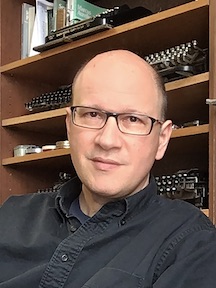By Ryan Kambich
Richard Polt (ΦBK, UC Berkeley) wants to change the way we talk about politics, using the study of the liberal arts as a means to enliven political discussion. During a bruising election year set to be rife with division and discord, in which much of what counts as political discourse appears caught up in Twitter feuds, Polt sees careful consideration of the liberal arts as a means to more meaningful conversations about our contemporary moment.
A professor of philosophy at Xavier University, in Cincinnati, Polt splits his time between teaching and directing the Ethics/Religion and Society (E/RS) program. E/RS is a curricular requirement and lecture series at the university that seeks to apply the study of the liberal arts tradition to address pressing social issues.
Since taking the helm of E/RS in 2018, Polt has elected to use “Conversations Across the American Divide” as the animating theme for the E/RS program. In that capacity, he has curated the program’s lecture series to host speakers drawn from the ranks of activists and academics in the liberal arts tradition meant to spark community discussions that model robust political dialogue. Past speakers have included philosopher Gregory Fried, director of the Mirror of Race project; historian Nancy Isenberg, author of White Trash: The 400 Year Untold History of Class in America; and literary critic Alan Jacobs, a contributor to The Atlantic and author of How to Think.
According to Polt, such conversations along the lines of the liberal arts tradition are necessary now more than ever. “Digital culture all too often discourages depth, patience, and multidimensional thinking,” Polt said. “Memes harden opinions while silencing conversations, and ironically, the abundance of information makes it all too easy to listen only to like-minded people. By introducing us to well-chosen texts, artworks, and theories that demand sustained attention, the liberal arts can fight this trend.”
A typical E/RS discussion will feature a half hour lecture by an invited speaker, followed by a prolonged discussion by a panel of commentators drawn from across a spectrum of ideas. Past discussions have featured socialists sharing the stage with libertarians, while others have had mathematicians and journalists discussing their approaches to politics side by side. The aim, according to Polt, is to “open the audience’s eyes to unsuspected truths without naively assuming that we can all reach consensus.”
“Unanimity on these issues is not possible or desirable,” he says, “but we can come to appreciate that what is authentically American cannot be reduced to one side or the other.”
Polt specializes in the thought of Martin Heidegger, and fellow academics in the field have lauded his work. One reviewer celebrated his expertise in stating, “in the Anglophone world, few if any know the Heidegger of the 1930s better than Richard Polt.”
He credits his study of the liberal arts for his approach to the E/RS program and its associated focus on resolving political divisions. “The breadth of perspectives, experiences, and methods in the liberal arts has given me a skeptical, modest view,” Polt explained. “Politics is necessary and meaningful, but it is an uncertain venture into an unpredictable future. A Socratic awareness of our own ignorance should moderate our political allegiances and encourage us to open our minds.”
On the connection between the liberal arts and our contemporary political moment, Polt offered:
“The more we learn about the history of our antagonisms and the best arguments that can be made for diverse positions, the less liable we are to be duped by propaganda and adopt simplistic stances. This requires stepping back from today’s media and current power struggles. In my own teaching, I’ve found that a 2,400-year-old text, Plato’s Republic, can help us get a fresh sense of what is at stake in politics.”
Perhaps we should take a moment to add the Republic to our reading lists and consider anew how a love of learning can help guide us in turbulent times.
Ryan Kambich earned his bachelor’s degree in philosophy, politics and the public at Xavier University, where he became a member of Phi Beta Kappa in 2019. Xavier University is home to the Pi of Ohio chapter of Phi Beta Kappa.




